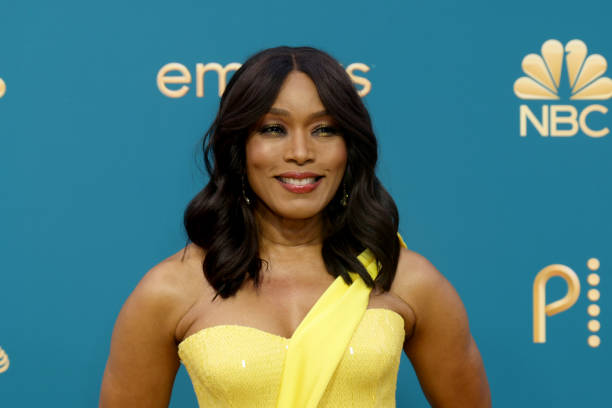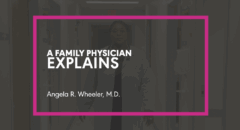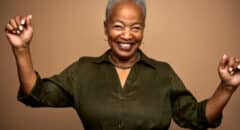
At 59 years old, Angela Bassett is pretty much like a unicorn: a mythical, magical creature of beauty that you only hear about. She's "black girl magic," old Hollywood glamour, very sex-kitten, and the model wife and mother all wrapped up into one. She has the body of a goddess and can show it off better than women half her age, but as it turns out she’s very much like us mortals and speaks about it in People.
“Even though people tell me I’m impervious to aging, I’m not,” says Bassett. “The scale isn’t going down the way it used to. It used to be easier, even as much as a year ago.”
But even the scale is going to get her down. Bassett is taking the change in her body in stride. “We check ourselves out in the mirror every day, we see the changes but you have to just do the best for yourself more often than not.”
“I’ll say to my glam team, ‘I have great arms, you might want to show that!’ I believe we all have something—great legs, beautiful hair—so find your something, be proud of it, and accentuate it.”
IF YOU LIKE THIS, YOU MAY LIKE: Angela Bassett's Love Life: "You Gotta Keep It Interesting"
When it comes to her butter pecan complexion, Bassett says her dedication to skin started in her teens when her mother would take her to a dermatologist every six weeks. “My mother and her siblings had a lot of challenges with her skin — and she did not want that for me,” she says.

That's why Bassett teamed up with Dr. Barbara Sturm, her friend and a well-known skincare expert, to launch a skin-care line that addresses the specific needs of women with darker complexions.
Bassett said that she wants to bring more awareness to skin care and for people, “to see what is good for it and ingredients that are helpful — not invasive or irritating. I like them to be pleased when they look in the mirror, to feel good about themselves and the condition of their complexion.”
TAKE A LOOK: 63-Year-Old Grandmother Looks Half Her Age
The five-item line called "Darker Skin Tones By Dr. Barbara Sturm" aims to reduce inflammations, even tones and minimize pores and hyperpigmentation.

Another facet of Bassett's road to healthy aging is taking a cue from those who came before her.
She is currently taking care of her mother-in-law (diagnosed with ALS). “It's unfortunate, but what we need to do is put a plan in place. ... So that she can continue to live in comfort to the best of her ability and to what her desires would be. It's something I wasn't able to do with my mother but, fortunately, I had the resources to care for her.”
The loss of her own mother and the declining health of her mother-in-law propelled Angela into spreading awareness of preparation for long-term care for aging family members. After her mother passed away in 2014, Bassett has teamed up with Genworth for the “Let’s Talk Now” initiative to spread the word. She assures us, “"I know the importance of it," she said of having the discussion with your kids or other loved ones. "It's absolutely something we are each going to deal with, our parents as well as ourselves, one day."
Referring to aging, Bassett stated, “"I know the importance of it," she said of having the discussion with your kids or other loved ones. "It's absolutely something we are each going to deal with, our parents as well as ourselves, one day." Bassett said that people as young as 30 and 40 should start talking about what they want as they age, and make provisions if that includes long-term care. Typical conversations may include living in an assisted living center or at-home-care, creating a will or taking out a long-term care insurance policy. When asked about the goal of “Let’s Talk Now”, Basset replied, “It really is about just taking the first step to plan for the future by having a conversation, and sometimes a conversation about aging and age is a difficult one,” she said. “But...
...a lot of conversations are tough to have, but it’s vital that we do have them. So we’re hoping to create empathy, educate, and just open up dialogue.”
A major problem associated with poor planning for long term care is high costs. More often than not, Medicare and Medicaid do not provide full coverage for these costs. According to a 2012 MetLife Market Survey of nursing home, assisted living, adult day services, and home care costs, nursing care can cost over $90,000 annually, assisted living over $42,000. The average cost of home health aide services are estimated at $21,000 annually. Bassett reveals how this affects the African American community. “In our community sometimes we move in with our parents, and move them into our homes and take care of them,” she said. “But even in that situation, where you have unpaid care they’ve found that you still end up paying on an average $8,000 to cover costs that aren’t covered by other means. So it’s just something that you have to have dialogue about and consider so that your parents, your lifestyle, and your expectations meet your financial reality.” The sooner you have an idea of how much money you would need to cover a loved one’s expenses, the sooner you can save up.
But Angela reminds us of the most important thing in an interview with Healthline:“You have to allow them to age in a way that they want to,” Bassett said in an interview with Healthline. “You let them lead.” Bassett advocates talking with loved ones instead of making plans for them.”
For more on your favorite celebrity's health, click here.









